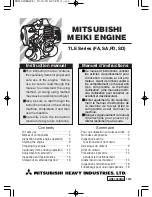
In United States Biodiesel blends of B6 to B20 must
meet the requirements listed in the latest edition of
ASTM D7467 (B6 to B20) and must be of an API
gravity of 30-45.
In North America biodiesel and biodiesel blends must
be purchased from the BQ-9000 accredited
producers and BQ-9000 certified distributors.
In other areas of the world, the use of biodiesel that is
BQ-9000 accredited and certified, or that is
accredited and certified by a comparable biodiesel
quality body to meet similar biodiesel quality
standards is required.
Engine Service Requirements
Aggressive properties of biodiesel fuel may cause
debris in the fuel tank and fuel lines. The aggressive
properties of biodiesel will clean the fuel tank and fuel
lines. This cleaning of the fuel system can
prematurely block of the fuel filters. Perkins
recommend that after the initial usage of B20
biodiesel blended fuel the fuel filters must be replaced
at 50 hours.
Glycerides present in biodiesel fuel will also cause
fuel filters to become blocked more quickly. Therefore
the regular service interval should be reduced to 250
hours.
When biodiesel fuel is used, crank case oil and
aftertreatment systems may be influenced. This
influence is due to the chemical composition and
characteristics of biodiesel fuel, such as density and
volatility, and to chemical contaminants that can be
present in this fuel, such as alkali and alkaline metals
(sodium, potassium, calcium, and magnesium).
• Crankcase oil fuel dilution can be higher when
biodiesel or biodiesel blends are used. This
increased level of fuel dilution when using
biodiesel or biodiesel blends is related to the
typically lower volatility of biodiesel. In-cylinder
emissions control strategies utilized in many of the
industrial latest engine designs may lead to a
higher level of biodiesel concentration in the sump.
The long-term effect of biodiesel concentration in
crankcase oil is currently unknown.
• Perkins recommend the use of oil analysis in
order to check the quality of the engine oil if
biodiesel fuel is used. Ensure that the level of
biodiesel in the fuel is noted when the oil sample is
taken.
Performance Related Issues
Due to the lower energy content than the standard
distillate fuel B20 will cause a power loss in order of 2
to 4 percent. In addition, over time the power may
deteriorate further due to deposits in the fuel injectors.
Biodiesel and biodiesel blends are known to cause an
increase in fuel system deposits, most significant of
which are deposits within the fuel injector. These
deposits can cause a loss in power due to restricted
or modified fuel injection or cause other functional
issues associated with these deposits.
Note:
Perkins
T400012
Fuel Cleaner is most
effective in cleaning and preventing the formation of
deposits. Perkins Diesel Fuel Conditioner helps to
limit deposit issues by improving the stability of
biodiesel and biodiesel blends. For more information
refer to “Perkins Diesel Fuel System Cleaner”.
Biodiesel fuel contains metal contaminants (sodium,
potassium, calcium, and/or magnesium) that form ash
products upon combustion in the diesel engine. The
ash can have an impact on the life and performance
of aftertreatment emissions control devices and can
accumulate in DPF. The ash accumulation may cause
the need for more frequent ash service intervals and
cause loss of performance
General Requirements
Biodiesel has poor oxidation stability, which can result
in long-term problems in the storage of biodiesel.
Biodiesel fuel should be used within 6 months of
manufacture. Equipment should not be stored with
the B20 biodiesel blends in the fuel system for longer
than 3 months.
Due to poor oxidation stability and other potential
issues, it is strongly recommended that engines with
limited operational time either not use B20 biodiesel
blends or, while accepting some risk, limit biodiesel
blend to a maximum of B5. Examples of applications
that should limit the use of biodiesel are the following:
Standby Generator sets and certain emergency
vehicles.
Perkins strongly recommended that seasonally
operated engines have the fuel systems, including
fuel tanks, flashed with conventional diesel fuel
before prolonged shutdown periods. An example of
an application that should seasonally flush the fuel
system is a combine harvester.
Microbial contamination and growth can cause
corrosion in the fuel system and premature plugging
of the fuel filter. Consult your supplier of fuel for
assistance in selecting appropriate anti-microbial
additive.
Water accelerates microbial contamination and
growth. When biodiesel is compared to distillate fuels,
water is naturally more likely to exist in the biodiesel.
It is therefore essential to check frequently and if
necessary, drain the water separator.
Materials such as brass, bronze, copper, lead, tin,
and zinc accelerate the oxidation process of the
biodiesel fuel. The oxidation process can cause
deposits formation therefore these materials must not
be used for fuel tanks and fuel lines.
SEBU8731
63
Refill Capacities
Fluid Recommendations
















































